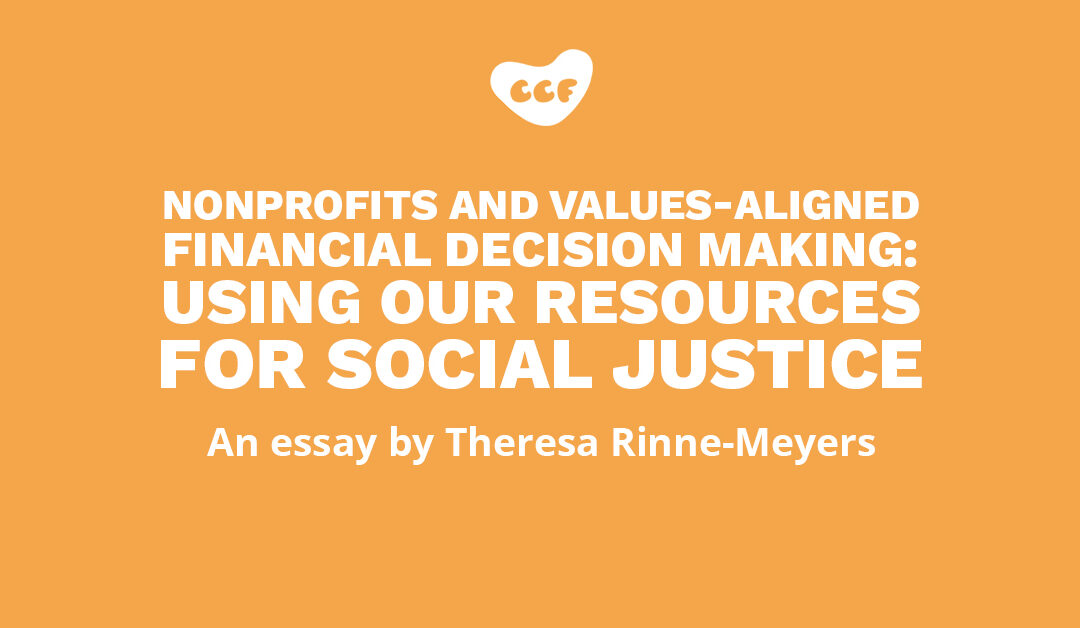By Theresa Rinne-Meyers, nonprofit director and advocate for a strong social sector
It’s no secret that nonprofits often have to make difficult budget decisions. However, many people don’t realize that these decisions can perpetuate some of the very systems we are trying to dismantle.
Nonprofits and the people who work at nonprofits are amazing. I believe that nonprofits – at their best – represent the best of humanity as we take care of one another, dismantle harmful and unjust systems, and dream up a more beautiful, safe, and prosperous world.
As someone who has worked in the nonprofit sector for a number of years, I’ve seen firsthand how limited our financial resources to tackle all this can be. I’ve been a part of several teams that applied for grants to run programs and received half the funding, but were expected to deliver the complete program. As a result, staff were expected to do double duty, the programs were diluted and less impactful, and resources that could have gone directly to clients were cut entirely – and I know this is, unfortunately, not an uncommon experience.
So, it’s no secret that nonprofits often have to make difficult budget decisions. However, many people don’t realize that these decisions can perpetuate some of the very systems we are trying to dismantle.
This is something that author and activist adrienne marie brown writes about in her book Emergent Strategy and speaks about on her podcast. She shares that how we are at the small scale is how we are at the large scale, which means that if we want to influence bigger financial and economic systems, we need to change how we use our organization’s financial resources.
5 ways to make more values-aligned financial decisions on the small scale to influence the large scale
1. Pay our workers well.
We don’t do this work for the money; however, we all have bills to pay. Unfortunately, I’ve been a part of several organizations where entry-level positions and staff with lived experience qualified for the very programs they were leading because they were not paid sufficiently. This not only contributes to income inequality, but also discourages those with lived experience from working in our sector.
When a beloved coworker shared with me how she was waiting in line for food assistance and clothing donations in the evenings while working to lead anti-poverty programs alongside me during the day, I started to think that perhaps we were losing sight of our bigger purpose as a sector.
If we want to advance economic mobility, we must model it by paying our staff (and interns!) fairly. For more on this topic, read this piece by Erika Chen, which offers strategies to advance pay equity in nonprofits.
2. Engage consultants from small, local firms.
When working with consultants, it’s not uncommon for nonprofits to engage a major management consulting firm because a board member or CEO is connected to that team. However, many qualified consultants from smaller firms or independent consultants with more nonprofit and social justice experience are just waiting to help us do our work better with a more solid understanding of our missions and values.
When I was searching for someone to lead my team in building a new set of strategies and activities for the organization, the one-woman shop I ended up bringing on had significant experience working with my exact client base. She brought an important racial equity lens to the work and contributed to our developing a solid strategy that was soon after funded by a local foundation—all with great success.
Let’s commit to paying our small and local consultants!
3. Bank responsibly.
Banking responsibly is also an important tactic to put our money where our values are. Many of us don’t think much about where our organizations bank, but banks hold a ton of our organizational resources and make money off those resources!
Divesting from banks that finance harmful projects such as oil pipelines and weapons manufacturing is an important way to ensure that our money is being used in alignment with our values. We should safekeep our organizational resources in values-aligned banks such as credit unions and socially responsible banks.
4. Buy our products from small and local businesses.
It’s no secret that many of us buy our work products from large retailers like Amazon and Walmart because they’re cheaper, but these retailers often harm our small and local businesses.
They exploit their workers through poor wages, wage theft, and union busting, among other tactics, contribute to environmental degradation, and avoid paying taxes. As much as we can, we should use our organizational resources to purchase products and services from small businesses, local businesses, and BIPOC entrepreneurs.
5. Make mission-aligned investments.
When it comes to investing our organizational resources, it’s important to make sure that our investments are mission-aligned. Many nonprofits and foundations invest their resources in the stock market to return any profits to our budgets.
While I’ve never sat at a leadership table that discussed investment strategies, I think it’s likely that these aren’t always mission-aligned. Wouldn’t it be neat if staff had greater visibility into this part of our organization and was part of the decision-making for how organizational resources are invested? Nonprofit Quarterly’s 2023 piece on impact investing in our sector is a good primer for those looking to learn more.
Nonprofits need to take a more values-aligned approach to their financial decisions. By paying our workers well, working with business owners and consultants from marginalized genders and backgrounds, banking responsibly, buying our products from small and local businesses, and investing responsibly, we can use our financial resources to influence bigger financial and economic systems.
Remember, how we are at the small scale is how we are at the large scale, so let’s use our resources to positively impact the world.

Theresa Rinne-Meyers
Theresa Rinne-Meyers (she/her) is a nonprofit director living in Denver, Colorado. With a decade of experience in nonprofit strategy, evaluation, advocacy, fundraising, and program management, Theresa can often be found exploring innovative approaches to enhance our sector’s impact even further. She’s pretty sure that Vu Le quoted her in his book, and this has been a top-five career highlight for her. You can find her on LinkedIn at www.linkedin.com/in/theresarinnemeyers.
Discover more from CCF
Subscribe to get the latest posts sent to your email.

